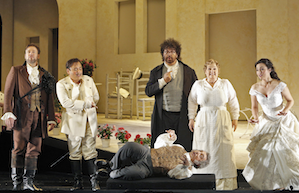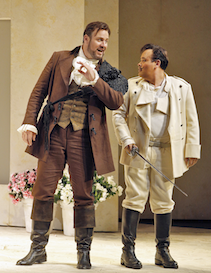
Photos by Cory Weaver
No amount of familiarity with Rossini’s Il Barbiere di Siviglia (The Barber of Seville), can dim its remarkable succession of fabulous tunes and ensembles. If director Emilio Sagi’s delightful new production for San Francisco Opera, which opened at the War Memorial Opera House on Wednesday night, doesn’t revitalize the comedy for those who think they've seen enough Barber's for this lifetime, nothing will.
The most important elements of Sagi’s conception, realized by set designer Llorenç Corbella and costume designer Pepa Ojanguren, are the progressive injection of color into an all-white setting; a mysterious dark underbelly, which allows for some amusing entrances and exits; the frequent hustle and bustle of “Andalusian street people” in the form of white clad dancers who provide visual counterpoint to Rossini’s rapid-fire coloratura; and a traveling road show’s worth of surprise props and shtick. If anything could begin to equal the thrill of Count Almaviva’s spectacular, often-cut, concluding aria and cabaletta, “Cessa di più resistere…Ah il più lieto” (Give up your resistance…Ah, of all loving hearts), it’s Sagi’s ending.
All that would amount to just so much fluff were it not for the singers and instrumentalists who bring Rossini’s music to life. In the pit, SFO scored big-time with Resident Conductor Giuseppe Finzi. He conducted with one eye on the sparkle and wit of Rossini’s score, and the other on the coloratura capacities of his artists. The orchestra bubbled along as though the body of every instrument had been primed with champagne. Bryndon Hassman and Finzi’s laughter-filled improvisatory commentary on fortepiano and harpsichord in the recitatives, and the extra instrumental color that a raised pit projected through the auditorium further enlivened the music.
A Whole Cast of Standouts
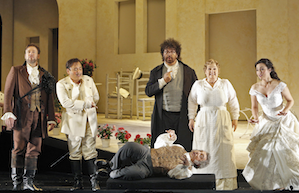
The opening night cast (who reappear November 16, 19, 22, and 26, and December 1) delivered top-flight performances. At their head was baritone Lucas Meachem (Figaro). The Adler Fellow / Merola alum not only sang with extremely handsome tone and proved adept at articulating every rapid-fire note in the score, but also infused his voice with the smile, wit, and color that the role demands. Meachem knew just when to open up his glorious sound, and when to pull back and wink at the audience.
In his use of a melting sotto voce (soft voice) and his subtle shading, Mexican tenor Javier Camarena (Count Almaviva) proved Meachem’s equal. His voice may be one size smaller, and lack the piercing brilliance and flawless trill of today’s leading exponent of the role, Juan Diego Flórez, but the intelligence with which Camarena deploys his resources, the clarity of his BB-gun coloratura, and his comedic verve provided compensation aplenty.
Veteran bass-baritone Alessandro Corbelli (Doctor Bartolo) may be 61, but he sings with the solidity and strength of a man in his prime. Corbelli’s intelligent performance managed to make Bartolo less stock, hence more enjoyable, than most.
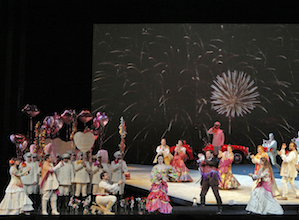
The big surprise was bass Andrea Silvestrelli (Don Basilio). That he managed to produce his cavernous sound while uncovering the wit that often deserted him in his recent depiction of Pistola in this season’s Falstaff, suggests Sagi’s helping hand. It’s a wonderful performance from a giant who seems cut out for more dramatic roles.
That leaves, among principals, the conundrum of mezzo-soprano Isabel Leonard. Perusing SFO’s list of admirable Rosinas in its previous 25 productions, I’ll wager that few flashed as winning a smile, or presented such an attractive figure as Leonard. If you closed your eyes on opening night, you heard a voice of considerable weight, flexibility, and notable beauty on top, but one which displayed a single, consistent color with little regard for the text and context. Rosina can be a sweetheart, but she is also a major tease and, as she warns in her famous aria, “Una voce poca fà” (A moment ago a voice resounded), a viper. Only once did Leonard alter her color enough to suggest Rosina’s multifaceted character.
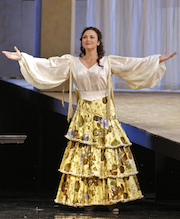
Character is never a challenge for veteran mezzo-soprano Catherine Cook (Berta). Not only did she excel in the role, but her energy made you want to hug her to bits. 2013 Operalia Competition winner and third-year Adler Fellow Ao Li (Fiorello), sang with such handsome tone and had so much fun onstage that it’s easy to imagine him scoring major triumphs sooner rather than later.
Do not discount the potential chemistry between the second cast’s husband-wife team of tenor Alek Shrader (Count Almaviva), he of The Audition fame, and Argentinean mezzo-soprano Daniella Mack (Rosina), a finalist in the 2013 BBC Cardiff Singer of the World Competition (November 14, 17, 20, 23, and 29). Those performances, which also bring the SFO debut of Maurizio Muraro (Doctor Bartolo) and U.S. debut of Audun Iversen (Figaro), may just bowl us over, as most of this cast did.

